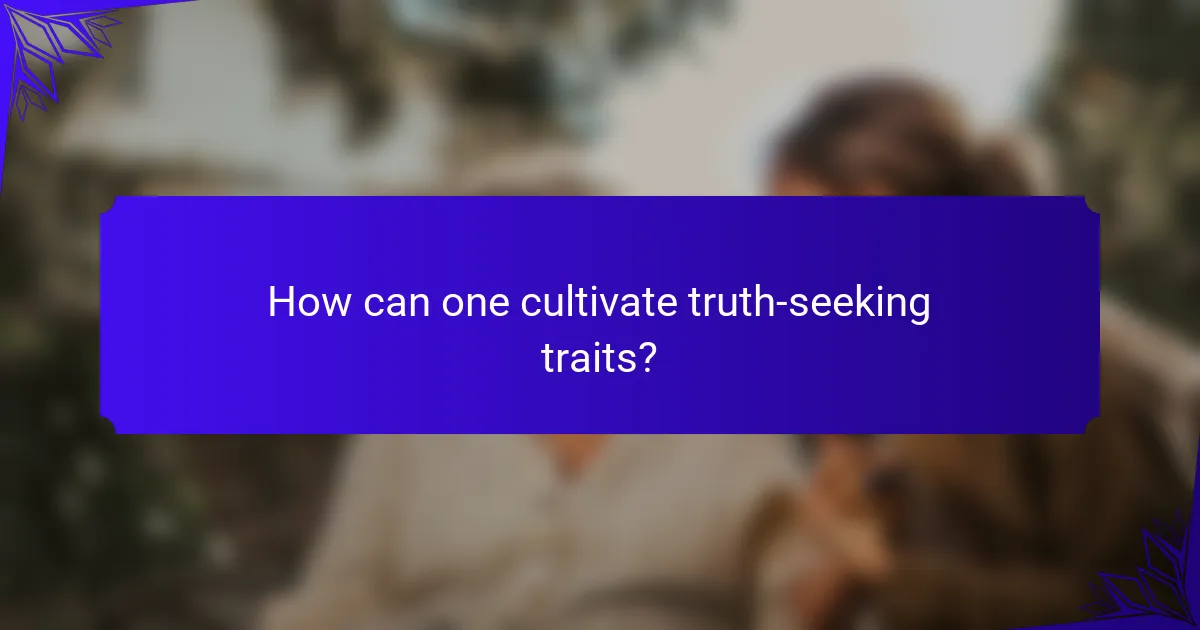Understanding whether truth seeking is a personality trait can enhance personal growth and learning. This exploration covers the attributes of curiosity, a growth mindset, and adaptability. It examines how these traits contribute to effective learning and the unique characteristics of exceptional truth seekers. Additionally, it discusses strategies to cultivate these essential traits for continuous knowledge pursuit.

Is truth-seeking considered a personality trait?
Yes, truth-seeking can be considered a personality trait. It embodies curiosity, a growth mindset, and adaptability, which are essential for effective learning. Truth seekers are driven by a desire to understand and explore various perspectives. This trait enhances their ability to adapt and thrive in changing environments. Research indicates that individuals with strong truth-seeking tendencies often exhibit higher levels of open-mindedness and cognitive flexibility, allowing them to embrace new information and ideas.
What defines a truth seeker in the context of personality?
A truth seeker embodies traits of curiosity, a growth mindset, and adaptability. These characteristics drive their pursuit of knowledge and understanding, allowing them to embrace new experiences and perspectives. Curiosity fuels their desire to explore beyond surface-level information, while a growth mindset enables them to view challenges as opportunities for development. Adaptability ensures they can adjust their beliefs and approaches based on new evidence or insights, making them resilient learners.
How does curiosity influence truth-seeking behavior?
Curiosity significantly enhances truth-seeking behavior by fostering an open mindset. Individuals driven by curiosity actively seek diverse perspectives and new information, which leads to deeper understanding. This growth mindset promotes adaptability, allowing learners to reassess beliefs based on evidence. Research indicates that curious individuals exhibit higher levels of engagement and persistence in problem-solving, enhancing their ability to discern truth.
What are the different forms of curiosity in learning?
Curiosity in learning manifests in various forms, including intrinsic curiosity, extrinsic curiosity, and epistemic curiosity. Intrinsic curiosity drives individuals to explore and learn for personal satisfaction. Extrinsic curiosity is influenced by external rewards or recognition. Epistemic curiosity focuses on acquiring knowledge and understanding complex concepts. Each form plays a crucial role in fostering a growth mindset and adaptability in learners.
How does curiosity manifest in everyday life?
Curiosity manifests in everyday life through questioning, exploration, and a desire for knowledge. Truth seekers exhibit this trait by actively seeking new information and experiences. They embrace challenges, leading to personal growth and adaptability. For example, engaging in diverse activities or conversations enhances understanding and fosters a growth mindset. This approach not only enriches learning but also encourages resilience in the face of obstacles.
What role does a growth mindset play in truth-seeking?
A growth mindset enhances truth-seeking by fostering resilience and adaptability in learning. Individuals with a growth mindset view challenges as opportunities for development, leading to deeper inquiry and exploration. This approach encourages curiosity, allowing truth seekers to embrace new information and perspectives. Research shows that a growth mindset correlates with increased motivation and engagement in learning processes, ultimately facilitating more effective truth-seeking behaviors.
How can a growth mindset enhance learning experiences?
A growth mindset significantly enhances learning experiences by fostering resilience and adaptability. Individuals with this mindset view challenges as opportunities for growth, leading to deeper engagement and improved problem-solving skills. Research indicates that embracing a growth mindset can result in higher academic achievement and greater persistence in the face of setbacks. This mindset encourages curiosity, allowing learners to explore new concepts and adapt their strategies effectively, ultimately enriching their educational journey.
What are the barriers to developing a growth mindset?
A growth mindset can be hindered by various barriers. Common obstacles include fear of failure, fixed beliefs about intelligence, lack of supportive environments, and negative self-talk. These factors can prevent individuals from embracing challenges, learning from criticism, and ultimately stifling their curiosity and adaptability. Addressing these barriers is crucial for fostering a growth mindset and enhancing learning experiences.
How does adaptability contribute to effective learning?
Adaptability significantly enhances effective learning by enabling individuals to adjust their approaches based on new information and experiences. This trait fosters resilience in the face of challenges, allowing learners to embrace change and uncertainty. Adaptable learners are more likely to engage in self-directed learning, actively seeking knowledge and skills that align with their evolving goals. Research indicates that adaptability is linked to a growth mindset, which encourages continuous improvement and openness to feedback. In essence, adaptability empowers learners to navigate diverse educational landscapes, ultimately leading to deeper understanding and sustained motivation.
What strategies improve adaptability in learning environments?
Fostering adaptability in learning environments involves strategies that encourage curiosity and a growth mindset. Implementing diverse teaching methods, promoting collaborative learning, and integrating real-world problem-solving tasks are effective approaches. These strategies enhance engagement, support individual learning styles, and cultivate resilience in students.
What are the signs of a highly adaptable learner?
Highly adaptable learners exhibit curiosity, resilience, and a growth mindset. They embrace challenges and seek feedback to improve. Their ability to adjust strategies and learn from experiences demonstrates flexibility. Additionally, they show openness to new ideas and collaborative learning.

What are the universal attributes of truth-seeking?
A truth seeker embodies curiosity, a growth mindset, and adaptability in learning. These universal attributes drive the quest for knowledge and understanding. Curiosity fuels the desire to explore new ideas and perspectives. A growth mindset fosters resilience and openness to learning from experiences. Adaptability allows individuals to adjust their thinking and approach based on new information. Together, these attributes create a robust framework for effective truth-seeking.
How does intrinsic motivation drive truth-seeking?
Intrinsic motivation significantly drives truth-seeking by fostering curiosity and a growth mindset. Individuals with intrinsic motivation are more likely to explore new ideas and challenge their beliefs. This motivation enhances adaptability in learning, allowing for deeper engagement with complex concepts. Research indicates that truth seekers exhibit a unique attribute of persistence in their quest for knowledge, leading to greater personal and intellectual growth. As a result, intrinsic motivation not only fuels the desire for truth but also cultivates a lifelong learning attitude.
What are common traits shared by truth seekers?
Truth seekers commonly share traits such as curiosity, a growth mindset, and adaptability. These characteristics drive their pursuit of knowledge and understanding. Curiosity propels them to ask questions and explore new ideas. A growth mindset enables them to embrace challenges and learn from failures. Adaptability allows truth seekers to adjust their perspectives based on new information. Together, these traits foster a continuous learning environment, essential for personal and intellectual development.

What unique attributes differentiate truth seekers?
Truth seekers are differentiated by their unique attributes of curiosity, a growth mindset, and adaptability in learning. Curiosity drives them to explore and question, leading to deeper understanding. A growth mindset allows them to embrace challenges and learn from failures. Adaptability enables them to adjust their learning strategies based on new information and experiences. Together, these attributes foster a continuous pursuit of knowledge and truth.
How does emotional intelligence enhance truth-seeking?
Emotional intelligence significantly enhances truth-seeking by fostering curiosity and adaptability. Individuals with high emotional intelligence can navigate complex emotional landscapes, allowing them to ask deeper questions and seek diverse perspectives. This trait supports a growth mindset, encouraging continuous learning and openness to new information. As a result, emotionally intelligent truth seekers are more likely to challenge assumptions and explore various viewpoints, ultimately leading to a more comprehensive understanding of truth.
What specific knowledge areas do truth seekers often explore?
Truth seekers often explore knowledge areas such as philosophy, science, psychology, and spirituality. These domains encourage curiosity, growth mindset, and adaptability in learning. Philosophy examines fundamental questions, while science provides empirical evidence. Psychology explores human behavior and cognition, and spirituality addresses existential inquiries. Each area enhances critical thinking and fosters a deeper understanding of the world.

What rare attributes can be found in exceptional truth seekers?
Exceptional truth seekers exhibit rare attributes such as intense inquisitiveness, unwavering resilience, and profound empathy. These traits enable them to navigate complex ideas and foster deeper understanding. Their curiosity drives them to explore beyond conventional boundaries, while adaptability allows them to embrace change and learn from diverse experiences. Additionally, their growth mindset empowers them to view challenges as opportunities for personal development.
How do exceptional truth seekers approach complex problems?
Exceptional truth seekers approach complex problems with curiosity, a growth mindset, and adaptability. They embrace challenges as opportunities for learning and exploration. This mindset allows them to dissect problems into manageable parts, analyze various perspectives, and synthesize information effectively. They are not deterred by uncertainty; instead, they view it as a pathway to deeper understanding. By leveraging their unique attributes, such as resilience and open-mindedness, they foster innovative solutions and continuous personal growth.
What unique perspectives do they bring to discussions?
Truth seekers contribute diverse insights by fostering open-mindedness, encouraging critical thinking, and promoting a culture of continuous learning. Their curiosity drives discussions that explore multiple viewpoints, enhancing understanding. This unique attribute of adaptability allows them to navigate complex topics effectively, making them valuable participants in any dialogue.

How can one cultivate truth-seeking traits?
Cultivating truth-seeking traits involves fostering curiosity, a growth mindset, and adaptability. These traits enhance learning and understanding.
To develop curiosity, engage with diverse perspectives and ask open-ended questions. This encourages exploration and deeper inquiry.
A growth mindset allows individuals to view challenges as opportunities for improvement. Embrace feedback and learn from failures to reinforce this mindset.
Adaptability is crucial in navigating new information. Practice flexibility in thought processes and be willing to adjust beliefs when presented with new evidence.
What practical steps can enhance curiosity and growth mindset?
To enhance curiosity and growth mindset, engage in continuous learning, seek diverse experiences, and embrace challenges. Practicing self-reflection, asking open-ended questions, and surrounding yourself with curious individuals also foster these traits. Setting specific goals and maintaining a positive attitude towards failure further supports personal growth.
What common mistakes should be avoided in the pursuit of truth?
To pursue truth effectively, avoid common mistakes such as confirmation bias, overconfidence, and neglecting diverse perspectives. These pitfalls can hinder curiosity, growth mindset, and adaptability in learning. Acknowledging these errors fosters a more comprehensive understanding of truth.
What expert insights can guide effective truth-seeking?
Effective truth-seeking is guided by curiosity, a growth mindset, and adaptability in learning. These attributes foster deeper understanding and open-mindedness. Curiosity drives exploration of diverse perspectives, enhancing knowledge acquisition. A growth mindset encourages resilience in the face of challenges, promoting continuous learning. Adaptability allows individuals to adjust their approaches based on new information, ensuring relevance in a changing landscape. Embracing these traits cultivates a robust framework for seeking truth and understanding complex issues.


